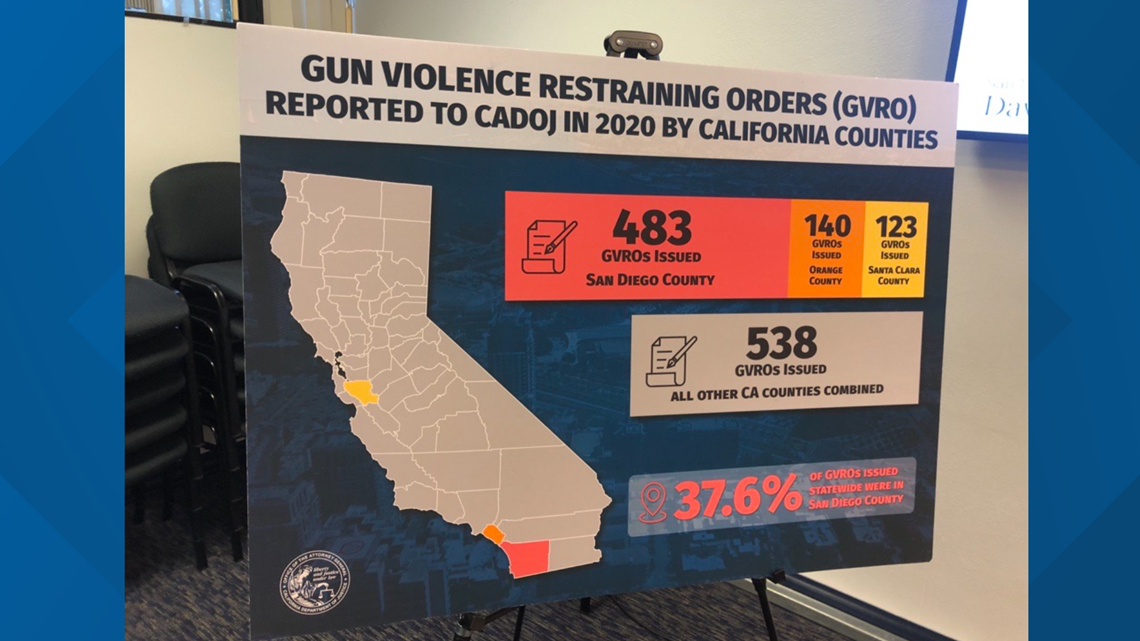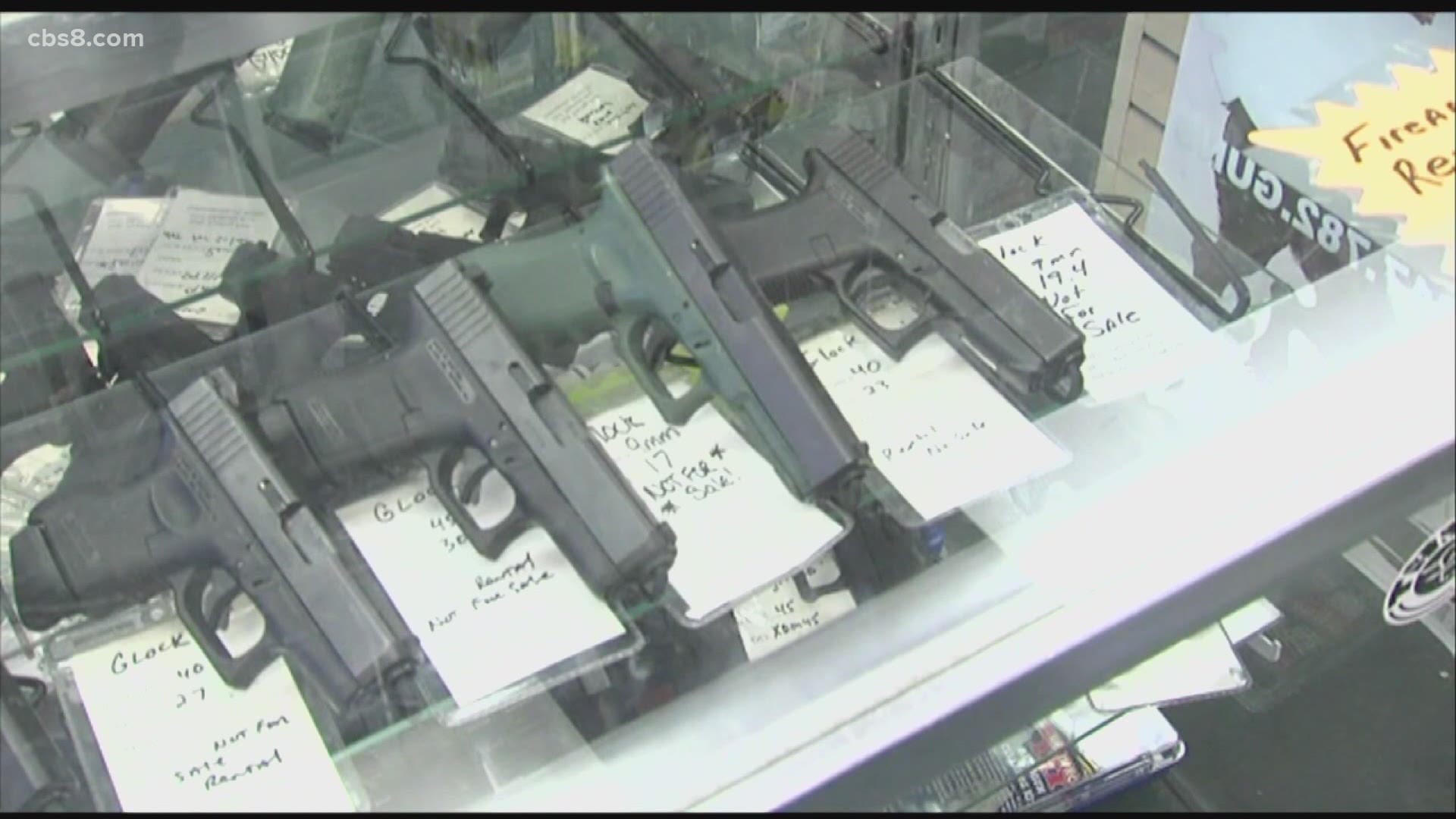SAN DIEGO — While state leaders are pushing for more widespread use of California's red flag laws, San Diego has set itself apart as the leader in pursuing gun-violence restraining orders: a pro-active law enforcement tool credited with saving lives.
Last year during the height of the pandemic, handgun sales in California shot up by a record 65% compared to the year before.
During that same time, homicides and domestic violence calls involving firearms also increased dramatically, according to the state's attorney general, who is now calling on law enforcement to make better use of these special laws already in place to help prevent gun violence.
One California mother, in particular, has been a passionate advocate for these laws.
"They knew he had guns: the warning signs were there," said Amanda Wilcox, talking about mental patient Scott Thorpe.
Thorpe killed her 19-year-old daughter Laura in a shooting spree in Northern California in 2001, while Laura was volunteering at a mental health clinic where Thorpe was being treated.
"Later, as we struggled to understand the circumstances of our daughter's death, we heard that the shooter's family, girlfriend and caseworker were all worried about him," said Wilcox, who now works for the Brady Campaign to Prevent Gun Violence.
Despite the clear warning signs, or "red flags," there was no legal mechanism to take Thorpe's guns away from him, before his rampage that ultimately claimed three lives.
"It was clear to us then, and it still is today, that there needs to be a way to remove firearms from a person who is in crisis, clearly dangerous and at risk of harming themselves or others," Wilcox added.
And now there is: known as California's red flag laws, which allow the courts to temporarily remove access to firearms from anyone who poses a serious risk of hurting themselves or others.
"It has been a game-changer," said San Diego Police Chief David Nisleit. "It is a very important tool."


Under red flag laws, a concerned family member, co-worker, teacher or employer can work with the legal system to request a gun-violence restraining order or GVRO.
"There may be a social media posting, a threat made at work, an ex-spouse who's trailing their ex-wife and their kids," said San Diego City Attorney Mara Elliott.
In one case, a GVRO was issued for a man who had recorded himself from the window of a hotel in downtown San Diego, while pretending to shoot pedestrians on the street below.
"Ultimately it is crisis intervention: that's what we are there to do," Elliott said, "Keep people safe, keep them alive."
Elliott, who launched San Diego's Gun Violence Response unit in 2017, pointed out that with the help of San Diego police, her office must make a compelling case to a judge, who ultimately decides whether to issue the order.
In fact, just last year, more than 37% of all gun-violence restraining orders issued throughout the entire state of California were issued in San Diego County, totaling 483 orders out of 1285 statewide.
On a recent visit to San Diego, California Attorney General Rob Bonta got a first-hand look at the success of San Diego's gun violence prevention efforts, including some of the 1,011 firearms seized through Red Flag laws.
"San Diego is really the epicenter of gun-violence restraining orders working," Bonta said. "Red flag laws work to keep people safe."
City Attorney Mara Elliott said her office is not focused on responsible gun owners.
"I am concerned about the ones who are not responsible," Elliott told News 8. "The ones who are threatening to harm themselves, or harm somebody else."
News 8 reached out to the NRA and the Firearms Policy Coalition for comment on San Diego's program. Neither responded.
"When those gun violence restraining orders are issued, lives are saved," California Assembly Member Phil Ting said in a recent interview with News 8.
Ting has been a strong advocate of the state's red flag laws, successfully backing legislation to expand their use to include educators, employers and co-workers who can petition the courts for a gun-violence restraining order.
"Law enforcement has had the ability to enforce gun violence restraining orders, but we just haven't seen it be a priority for most law enforcement agencies," TIng said
Ting pointed to San Diego as the exception, and recently secured an additional million dollars in state funding over the next three years, allowing the San Diego City Attorney's office to continue training law enforcement agencies throughout California in how to successfully use Red flag laws.
It has already trained about 400 agencies statewide.
"This is an example of something that has worked," Bonta said. "That can work in more places."
"We'll never know how many lives we've saved, but I have to believe of the hundreds of restraining orders we've achieved that we have saved some lives," Elliott added. "And that is good enough for me."
For more information on how gun violence restraining orders work, and how to petition for an order if you are concerned about someone, click here.
WATCH RELATED: Attorney General Bonta Releases 2020 Gun Sales Data, Calls on Californians to Use Red Flag Laws - July 1, 2021

